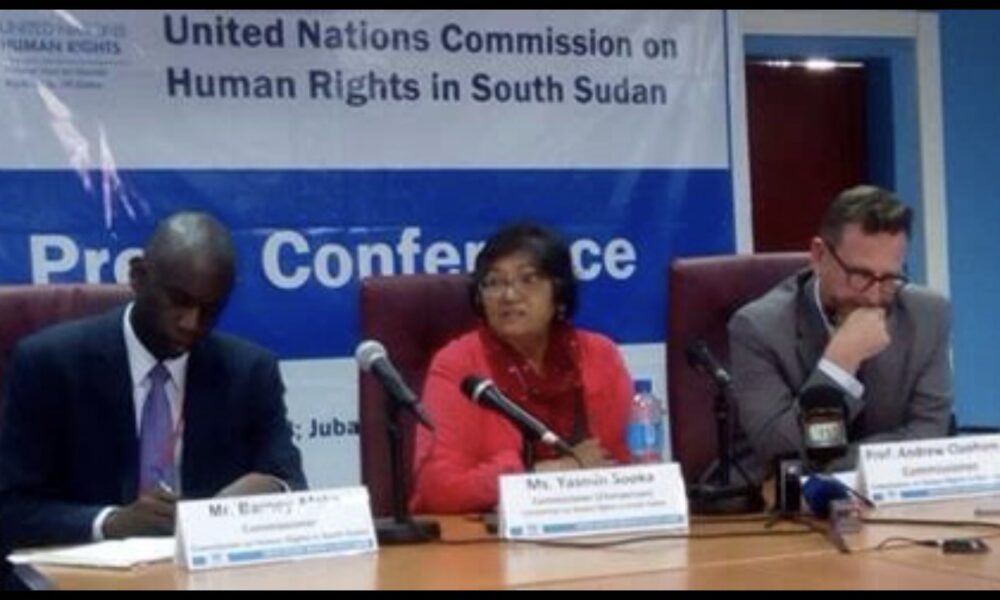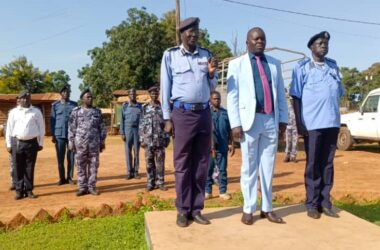By Philip Buda Ladu
South Sudan’s fragile 2018 Revitalized Peace Agreement stands on the precipice of total collapse, the UN Commission of Human Rights on South Sudan, warned.
Friday, 13th June warning came with an urgent plea for decisive and coordinated regional intervention to rescue the faltering peace process.
In a statement extended to this outlet, the Commission underlined that escalating military offensives, widespread political crackdowns, and the unsettling presence of foreign military forces that are rapidly dismantling the accord, plunging the nation into deeper fear, instability, and profound trauma.
“South Sudan’s peace agreement is in crisis,” declared Yasmin Sooka, Chair of the Commission. “The renewed violence is pushing the Revitalized Peace Agreement to the brink of irrelevance, threatening a total collapse. Such a breakdown risks fragmenting the country even further.”
Sooka emphasized that regional partners, particularly the African Union and IGAD, must immediately exert greater leverage and pressure on South Sudan’s leaders.
The goal, she stressed, is to de-escalate tensions, facilitate a return to meaningful dialogue, and ensure the full implementation of the peace agreement, which remains “the only credible pathway to stability, peace, and democratic transition.”
Earlier this week, the Commission said it engaged in crucial consultative dialogues with various stakeholders, including civil society representatives, to ascertain the gravity of the deepening crisis and explore strategies to prevent a full-scale return to civil war.
Notably participants conveyed widespread apprehension and anxiety among communities, who are increasingly traumatized by persistent violence, arbitrary arrests, and a shrinking civic space.
Alarming reports indicate that since March 2025, the South Sudan People’s Defense Forces (SSPDF) have launched sustained military operations, including destructive airstrikes on civilian-populated areas, resulting in significant casualties and mass displacement according to the UN. A state of emergency has been declared in several regions where these operations persist.
Further fueling public fear are credible reports of Ugandan forces supporting the SSPDF, coupled with the government’s controversial move to recruit thousands of additional soldiers – a measure seemingly outside the security sector reform commitments of the Revitalized Agreement and signaling a potential for protracted conflict.
“South Sudanese are living with extreme trauma. They are enduring targeted military attacks that have upended lives and instilled widespread fear,” stated Commissioner Carlos Castresana Fernández.
He vehemently criticized the ongoing recruitment drive by the SSPDF, calling it a direct contradiction of the Revitalized Agreement, which mandates the training and deployment of the Necessary Unified Forces.
“The country’s leaders – signatories of the Agreement – must abandon partisan agendas and act in the interest of the people,” he urged. “The world cannot remain a bystander while civilians are bombed, and opposition voices are silenced. The time for passive diplomacy is over – these senseless attacks must stop.”
Political tensions have sharply escalated following the arbitrary detention of key opposition figures, including the First Vice President, Dr. Riek Machar. This crackdown coincides with the expanded military operations by the SSPDF, targeting both populated civilian areas and armed opposition forces the Commission stressed.
The intensifying armed violence has gravely exacerbated South Sudan’s already dire humanitarian and human rights crises. Civilians in Upper Nile State have been particularly hard-hit, as the region – already struggling with emergency-level food insecurity – has become a critical transit corridor for refugees fleeing the ongoing conflict in neighboring Sudan.
Fears are mounting that without a swift change in trajectory, South Sudan’s conflict will become dangerously intertwined with the crisis in Sudan, leading to even more catastrophic consequences.
Commissioner Barney Afako underscored the critical importance of salvaging the peace agreement.
“Salvaging South Sudan’s peace agreement should be of utmost priority in an already turbulent region, as the agreement enables political adversaries to partner towards a transformative transition in this country,” he said.
“Torpedoing the transition is an act of profound folly and recklessness that is already reigniting violence, deepening insecurity, and imposing further grave violations on long suffering citizens, and undermining regional peace architectures. Regional partners and peace guarantors must not indulge these damaging machinations; rather, they should resolve to urgently restore a credible transition that will deliver citizens’ aspirations for durable peace and justice,” he urged.
The Commission reiterated its appeal to regional and international actors to intensify diplomatic pressure on South Sudan’s leadership to ensure immediate de-escalation and the full implementation of the Revitalized Agreement.
Meanwhile, Chair Yasmin Sooka warned that “any unilateral attempts to derail the transition and undermine regional peace architectures have grave implications for peace and security in the Horn of Africa, and that failure to act could plunge the country into another devastating cycle of conflict.”
The Commission affirmed its commitment to closely monitor developments and continue documenting human rights violations and abuses committed by all parties, including those potentially amounting to war crimes.



